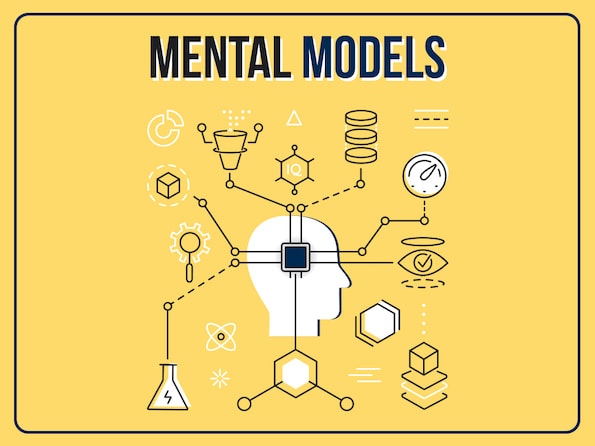
We constantly make decisions throughout our lives, from the routine to the life-altering. Surprisingly, a significant portion of these decisions are made subconsciously. Our brains, efficient at handling vast amounts of information quickly, often resort to shortcuts or patterns based on past experiences. These are what we term as “mental models.” Gaining insight into these mental models is indeed a liberating experience.
Each one of us is influenced by biases. These biases, influenced by our life experiences, culture, upbringing, and numerous other factors, often operate silently in the backdrop of our minds. They can sway our judgment, sometimes leading us off course from our best interests or an objective viewpoint. A deeper understanding of our mental models offers us a lens to recognize and mitigate these biases, thereby refining our decision-making processes.
When we bring our mental models to the forefront of our consciousness, we unlock the potential to challenge and refine them. This involves introspecting about our thought patterns, widening our perspectives, and welcoming diverse viewpoints. Consequently, our thought processes become more sophisticated, enabling us to make better-informed decisions.
Relying solely on past experiences, while invaluable, has its limitations. Just because a particular strategy worked in the past doesn’t guarantee its success in a different context. Being aware of our mental models equips us to identify when we are leaning too heavily on outdated patterns. This awareness encourages us to actively seek fresh solutions and perspectives.
Several of our mental models are intertwined with our emotional responses. Recognizing this connection enables us to grasp our emotional triggers and responses better. This understanding can develop improved emotional regulation, enhance interpersonal relationships, and promote more empathetic decision-making.
In our rapidly changing world, adaptability is essential. The strategies and decisions that yielded results yesterday might not be as effective today. By actively engaging with and updating our mental models, we position ourselves to adapt swiftly to evolving circumstances. This ensures our decisions remain timely and anchored in the present.
The subconscious mind is undeniably powerful, guiding us through life’s challenges. However, it’s not without its shortcomings. The mental models lodged in our subconscious have been moulded by various influences, some of which may have lost their relevance. By consciously addressing these models, we can adjust, challenge, and refine them. This proactive approach enhances our decision-making capability, ensuring our choices are both informed and aligned with our current objectives and the reality around us.
Now, let’s explore some key mental models that salespeople can utilise
Empathy Map – Think of this as a compass guiding us towards deeper human understanding. It breaks down the human experience into elements like feelings, sights, sounds, and actions. A skilled salesperson taps into this map to connect with a customer’s emotional and practical needs.
The Pareto Principle (80/20 rule) – Picture a vibrant garden where a mere 20% of the plants contribute to 80% of the yield. In sales, identifying where to allocate resources can lead to significant outcomes. Focusing energy towards the most fruitful tasks or clientele becomes crucial.
Loss Aversion – Imagine tasting honey but being hyper-aware of a bee’s potential sting. Behavioural economics suggests that the fear of loss often overshadows the pleasure of gain. Sales strategies, when built on this understanding, can effectively highlight the risks of bypassing a product or service.
Confirmation Bias – It’s like viewing the world through a distinct coloured lens, emphasising only what matches that shade. This natural tendency to favour information that confirms existing beliefs can be a pitfall. Salespersons should be aware of this bias in themselves and their customers to guide conversations effectively.
Second Order Thinking – Think of it as a chess game, where immediate moves and their subsequent implications are considered. It goes beyond immediate effects to consider the following ripple effects. For sales, this perspective helps in predicting a customer’s long-term response to a product or service.
In essence, the world of sales, much like several other professions, demands a balanced blend of diverse mental models. As salespeople journey through their professional paths, integrating and adapting new mental models isn’t just advantageous – it’s essential. By utilising these intellectual tools, we can refine our decision-making, cultivate richer connections, and excel in our roles.
